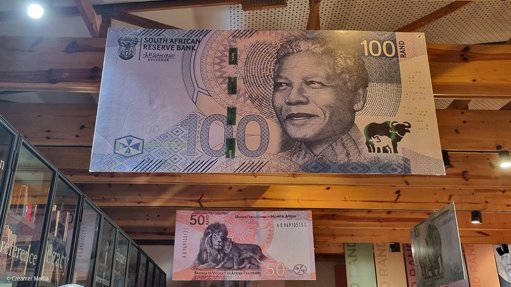The old blood
There is nobody who will say that the new CEO of State-owned electricity utility Eskom, André de Ruyter, is doing a bad job. When he took over, Eskom was in a bad way. It was rife with corruption and coal theft, poor maintenance and had two overpriced new power stations which had been poorly designed and badly built.
Corruption in Eskom existed from the bottom to the top and was interlinked between departments. Debt by municipalities and Soweto amounted to over R30-billion. Government bail-outs were the order of the day. Hundreds of thousands of litres of diesel, supposedly used in gas turbines for backup generation, were not delivered but nevertheless paid for. No wonder the utility was in poor shape. All this happening and not being stopped was entirely due to the previous management and the Eskom staff employed by them. I am not sure that it is relevant for me to name the Eskom CEOs under whom the collapse occurred but, put simply, Eskom went from a profit of about R12-million some years ago to a huge debt currently.
It is interesting to look at financial crises which have affected other large enterprises: Chrysler Corporation, GM, Ford (2008), Boeing (1998) and others. All these were due to slack management, poor planning and general inefficiency. None of these was due to the people at the top stealing the apples. All of them recovered by debt restructuring, cost cutting and better leadership.
Eskom, hopefully, is getting better. But why did it all go south in the first place? It seems to me that, in South Africa, we are hell-bent on making sure that all structures which have been built up and used to run well now collapse into debt and government bail-out. They are all going downhill: municipalities, railways, airlines. When I say ‘we’, I do not mean just government; I mean all of us are hell-bent. It is my impression that the persons considered best for the posts at all levels of government are the ones who have inappropriate qualifications but have an impressive record at arranging employment for friends and family and giving construction and other projects to organisations that supply healthy kickbacks.
When this style of operation is applied to an organisation such as Eskom, the results are exactly what has happened and now exists: a power system which is not as reliable as it was 30 years ago, an energy cost (per kilowatt hour) which is 900 times (no, it is 900 times) more expensive than 30 years ago and an Eskom staff which is way, way more than needed to run the organisation. This is surely one of those moments when we have to really stop and say: “Is this what I want?” Naturally, it is not what anybody wants. Citizens want a town where the water supply actually supplies water. In many towns, the water supply worked for years. It is not rocket science: keep the treatment plant going, service the pumps. In many towns, it is not working. In many districts, various municipalities paid their electricity accounts and Eskom kept supplying them with electricity. But that is not what is happening now. All over the country, the roads and pavements used to be serviceable. But that is not happening now.
So, what is to be done? The answer may lie in an anecdote about President Abraham Lincoln of the US, told during the US civil war: When someone charged General Grant, in the President’s hearing, with drinking too much liquor, Lincoln, recalling Grant’s successes in battle, said that, if he could find out what brand of whisky Grant drank, he would send a barrel of it to all the other commanders. And, thus, we have here at this moment our own General Grant in the form of André De Ruyter of Eskom. Eskom is not out of the woods yet, but when that happens, we should send barrels of some De Ruyter medicines to other organisations in this country.
Article Enquiry
Email Article
Save Article
Feedback
To advertise email advertising@creamermedia.co.za or click here
Comments
Press Office
Announcements
What's On
Subscribe to improve your user experience...
Option 1 (equivalent of R125 a month):
Receive a weekly copy of Creamer Media's Engineering News & Mining Weekly magazine
(print copy for those in South Africa and e-magazine for those outside of South Africa)
Receive daily email newsletters
Access to full search results
Access archive of magazine back copies
Access to Projects in Progress
Access to ONE Research Report of your choice in PDF format
Option 2 (equivalent of R375 a month):
All benefits from Option 1
PLUS
Access to Creamer Media's Research Channel Africa for ALL Research Reports, in PDF format, on various industrial and mining sectors
including Electricity; Water; Energy Transition; Hydrogen; Roads, Rail and Ports; Coal; Gold; Platinum; Battery Metals; etc.
Already a subscriber?
Forgotten your password?
Receive weekly copy of Creamer Media's Engineering News & Mining Weekly magazine (print copy for those in South Africa and e-magazine for those outside of South Africa)
➕
Recieve daily email newsletters
➕
Access to full search results
➕
Access archive of magazine back copies
➕
Access to Projects in Progress
➕
Access to ONE Research Report of your choice in PDF format
RESEARCH CHANNEL AFRICA
R4500 (equivalent of R375 a month)
SUBSCRIBEAll benefits from Option 1
➕
Access to Creamer Media's Research Channel Africa for ALL Research Reports on various industrial and mining sectors, in PDF format, including on:
Electricity
➕
Water
➕
Energy Transition
➕
Hydrogen
➕
Roads, Rail and Ports
➕
Coal
➕
Gold
➕
Platinum
➕
Battery Metals
➕
etc.
Receive all benefits from Option 1 or Option 2 delivered to numerous people at your company
➕
Multiple User names and Passwords for simultaneous log-ins
➕
Intranet integration access to all in your organisation


















